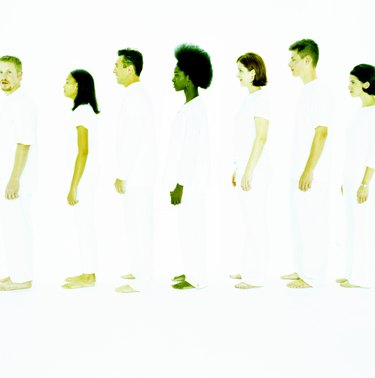
Value is the lightness or darkness of a color, as it has to do with the addition of white or black and not with the mixing of color. Sometimes called tone, value is an important concept for a painter, photographer or printmaker to comprehend. Once you understand the concept of value, the task of using the full range of color tones to create an interesting painting becomes easier.
Grayscale
Video of the Day

To understand value it is best to start with a grayscale, which is concerned only with the different tones of black and white. If you a pick a value of gray in the mid-range (halfway between black and white), then you can lighten or darken the original gray color to create new color values. At each end of the scale you will find the colors of pure white and pure black.
Video of the Day
Tints and Shades

When you add white to a specific color, blue for example, the resulting color is referred to as a tint of the original color. When you add black, the slightly darker color is called a shade. In this manner you can make a tonal scale of colors by adding different amounts of either white or black to the original color.
Tonal Range
You establish a tonal range by adding different amounts of black or white to one base color. You then place the resulting values of color side by side, so you can view the whole range of lightness and darkness at once. If you added your whites and blacks in equal amounts and increments, the result should be a gradient of steadily changing color. This is your tonal range.
Converting To Grayscale

A helpful exercise for painters is to make a grayscale copy of a painting. This is roughly the same as taking a black and white photograph of the picture. However, you can simplify the process by scanning the picture and the putting the scanned image in Photoshop, where you can convert it to black and white.
Flat Painting

Viewing the grayscale reproduction of your painting will tell you lot about how well you have used color values in your work of art. A flat, gray picture will indicate that your choice of color has all been in the mid-range of the painting, while a mixture of whites, blacks and mid-range gray is a positive sign that your work has lots of contrast that may catch the eye of the viewer.